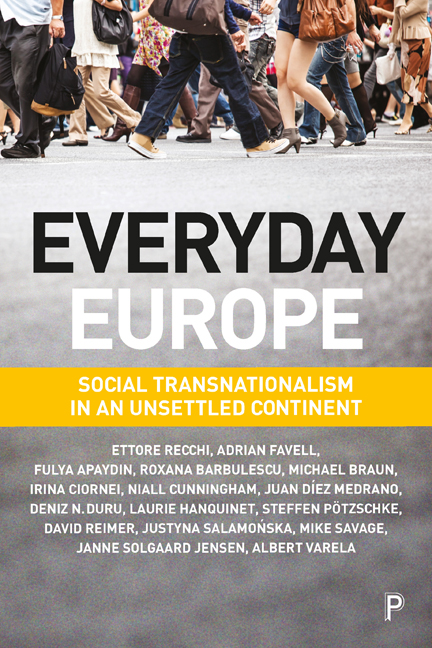Book contents
- Frontmatter
- Contents
- List of tables and figures
- Notes on contributors
- Acknowledgements
- Introduction: Social transnationalism in an unsettled continent
- one Cartographies of social transnationalism
- two The social structure of transnational practices
- three Cultural boundaries and transnational consumption patterns
- four Social transnationalism and supranational identifications
- five Explaining supranational solidarity
- six Narratives and varieties of everyday transnationalism
- seven Understanding Romanians’ cross-border mobility in Europe: movers, stayers and returnees
- eight Transnational Turkey: the everyday transnationalism and diversity of Turkish populations in Europe
- Epilogue Is social transnationalism fusing European societies into one?
- Methodological appendix
- Index
three - Cultural boundaries and transnational consumption patterns
Published online by Cambridge University Press: 19 April 2022
- Frontmatter
- Contents
- List of tables and figures
- Notes on contributors
- Acknowledgements
- Introduction: Social transnationalism in an unsettled continent
- one Cartographies of social transnationalism
- two The social structure of transnational practices
- three Cultural boundaries and transnational consumption patterns
- four Social transnationalism and supranational identifications
- five Explaining supranational solidarity
- six Narratives and varieties of everyday transnationalism
- seven Understanding Romanians’ cross-border mobility in Europe: movers, stayers and returnees
- eight Transnational Turkey: the everyday transnationalism and diversity of Turkish populations in Europe
- Epilogue Is social transnationalism fusing European societies into one?
- Methodological appendix
- Index
Summary
Introduction
Although a great deal is known about the significance of national, ethnic, religious and social identifications within and between European nations, we know very little about the wider drawing of cultural boundaries. This is a surprise given the sociological interest in cultural divisions, their relationship with consumption practices and lifestyles and their intersections with other aspects of inequality (see Bennett et al 2009; Prieur and Savage 2011). The EUCROSS project represents a unique opportunity to understand how Europeans differentiate between each other in terms of their cultural tastes and practices and how this is linked to their mobility practices and different sub- or-supranational identities.
Our starting point is the familiar idea, often associated with the sociologist Pierre Bourdieu but by no means only him, that modern societies are characterised by a fundamental opposition between highbrow and popular culture. The former is associated with the capacity to decipher complex cultural genres, so permitting the ability to abstract and develop high levels of expertise. The latter is much more immediate and bound up with the routines of everyday life and does not lend itself to a ‘scholastic orientation’. For Bourdieu, this distinction has wider implications, since those with highbrow cultural capital will be more likely to achieve higher levels of educational attainment and will be more privileged than those without.
Bourdieu's original study, Distinction (1979), was based on French society in the 1960s and 1970s, and was largely unreflective about the assumption that France was a nationally bounded society. In the period since he wrote, scholars informed by post-colonialist thinking have been critical of the Eurocentric notion of ‘high culture’ which Bourdieu deploys – with the assumption that the European classical canon was the necessary benchmark of cultural capital (see eg Bennett et al 2009; Savage et al 2010; Meulemann and Savage 2013). This criticism links with the argument of numerous scholars that, although Bourdieu's theory is still very relevant to understand the mechanisms that tie culture and social divisions together, his specific arguments about the relationship between cultural hierarchy and taste need to be updated (Prior 2005; Hanquinet et al 2014; Savage et al 2015; Hanquinet and Savage 2016).
- Type
- Chapter
- Information
- Everyday EuropeSocial Transnationalism in an Unsettled Continent, pp. 87 - 114Publisher: Bristol University PressPrint publication year: 2019



